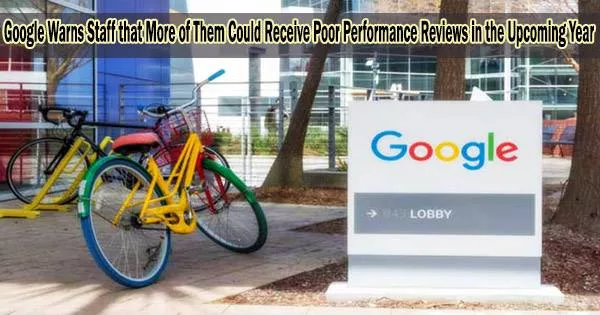According to internal correspondence that CNBC was able to access, more Google employees will be at risk for receiving poor performance evaluations and fewer are anticipated to receive great ratings under a new performance review system that begins next year.
More information about Google’s new performance assessment procedure was offered by management last week in a separate presentation and at a recent all-hands meeting. According to Google, 6% of full-time employees under the new system will fall into a low-ranking group that puts them at a higher risk for corrective action, up from 2% under the old method. Simultaneously, it will be harder to achieve high marks: Google projects 22% of employees will be rated within one of the two highest categories, versus 27% before.
As an example, in order to make the new, highest rated category, “Transformative Impact,” an employee must have “achieved the near-impossible” and contributed “more than we thought possible.”
Earlier this year, Google announced the new process for performance reviews, known as Google Reviews and Development, or GRAD.
However, CNBC recently revealed that close to the year-end deadlines, staff had complained about procedural and technical challenges with GRAD, leaving them fearful that their ratings wouldn’t be correct. A slew of layoffs in the tech sector adds to the worry. Although Google has so far escaped the widespread layoffs that have affected other Internet firms like Meta, staff members have grown concerned that they might be the next.
Employees voiced their anger with leadership during an all-hands meeting on the subject in December, saying that while they have long praised transparency, they have not been forthcoming with information regarding headcount. Some employees think the corporation might slash personnel by implementing the new performance review system.
We really don’t know what the future holds so unfortunately I cannot make forward looking commitments but everything we’ve been planning on as a company for the past six to seven months has been do all the hard work to try and work our way through this as best as possible so, that’s all I can say.
CEO Sundar Pichai
Headcount has been a subject of employee concern throughout the latter part of 2022. CEO Sundar Pichai found himself on the defensive in September, as he was forced to explain the company’s changing position after years of supercharged growth. Executives said at the time that there would be small cuts, and they didn’t rule out layoffs.
And in a November all-hands meeting, some workers questioned leaders’ objectives about headcount and even questioned whether they handled it well as Google’s staff increased by 24% year over year in Q3 2022.
As of Q3, the company employed 186,779 full-time employees. It also employs a similar amount of contractors.
Recent documents about the GRAD also say the company will be looking at bonuses, pay and equity and expects to “spend more per capita on compensation overall.” One also states the company still plans on paying within the top 5% to 10% of market rates.
Google did not immediately respond to a request for comment.
‘A lot of distress and anger’
According to recordings of the meeting obtained by CNBC, several of the most popular questions at the company’s most recent all-hands meeting on December 8 discussed the stress surrounding year-end performance reports. The survey questions also revealed that some workers don’t believe the company’s executives are being honest about how it manages headcount.
“Why did Google push support check-in quotas to front line managers days before the deadline?,” one employee asked, in a question read aloud by Pichai. “I’ve been through a lot in Google in 5+ years but this is a new low.”
“It seems like a lot of last-minute support check-ins were forced through part of Cloud in order to meet a quota, causing a lot of distress and anger,” another employee asked. “With only two weeks to correct course, how is this helpful feedback? How do we prevent this from happening in the future?”
“The support check-in process is confusing, increasingly becoming a cause of stress and anxiety in Googlers, especially given the current economic situation and rumors around layoffs,” said another top-rated employee question.
Earlier this month, CNBC reported employees began receiving “support check-ins” often associated with lower performance ratings in the final days leading up to year-end deadlines. They also said executives changed parts of the process in the final days.
“I know it’s been bumpy,” Google’s chief people officer Fiona Cicconi, eventually said, briefly acknowledging the issues with GRAD in a recent all-hands meeting.
“It’s not ideal to have support check-ins occur so late in the review cycle and we know that people need time to absorb the feedback and take action on it,” admitted Cicconi, adding that “Googlers should have plenty of time to course-correct.”
In order to minimize headcount in 2023, several staff also questioned bosses about any quotas they had in place for moving people into lower performance categories. Executives claimed they had no quotas, but this didn’t appear to persuade the workforce.
One question asked executives if Google was becoming “a stack-ranking company like Amazon,” referring to the process of using quotas to place employees in certain performance buckets.
“Uncertainties around GRAD processes have been putting a lot of pressure on lower level managers to pass down information” about performance reviews and sometimes force “conflicting items,” another highly-rated question stated.
Another read: “Layoffs across the industry has been a topic impacting Googlers, raising stress, anxiety and burnout,” another read. There’s been no official comms on this, which raises even more concern around this. When will the company address this topic?”
But executives largely avoided answering the questions directly. CEO Sundar Pichai kept saying he “doesn’t know what the future holds.”
“What we’ve been trying hard to do is we are trying to prioritize where we can so we are set up to better weather the storm, regardless of what’s ahead,” Pichai said. “We really don’t know what the future holds so unfortunately I cannot make forward looking commitments but everything we’ve been planning on as a company for the past six to seven months has been do all the hard work to try and work our way through this as best as possible so, that’s all I can say.”
















